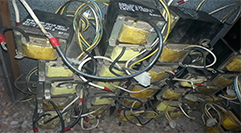TYPES OF TRANSFORMER AND THEIR USES
- A
varying current in one coil of the transformer produces a varying magnetic
field, which in turn induces a varying electromotive force or EMF in a
second coil.
- Power
can be transferred between the two coils, with out a metallic connection
between the two circuit.
- There
are Several transformer types used in the electrical power system for
different purposes, like in power generation, distribution and
transmission and utilization of electrical power.
Types of Transformer.
There are seven Categories of Transformer.
- According
to Construction.
- According
to Core Medium.
- According
to Voltage Level.
- According
to Types of Supply.
- According
to their Use.
- According
to Instrument.
- According
to the place of use.
According to Construction.
- The construction of a transformer is dependent upon how the primary and Secondary winding's are wound around the central laminated steel core.
- The two most common and basic designs of transformer construction are the
Core Type Transformer.
The cylindrical coils have different layers and each layers
is insulated from each other.
Low voltage winding are placed nearer to the core, as they
are easier to insulate.
Shell Type Transformer
The coils are former wound and mounted in layers stacked
with insulated between them ,A shell type transformer may have simple
rectangular form or it may have a distributed from.
According to core Medium
Based on the medium placed between the primary and secondary
winding the transformers as classified as .
1. Air core Transformer.
2. Iron core Transformer.
Air Core Transformer.
The primary and Secondary winding wounded on non-magnetic
strip where the flux linkage between primary and secondary is through the air.
The mutual inductance effect is much less in air core
compared to iron core i.e the reluctance offered to the generated flux is high
in the air medium where as in the iron core it is less.But the hysteresis and
eddy current losses which are dominant in iron core type are less or completely
eliminated in air core types transformer.
Iron Core Transformer.
The primary and secondary winding are wound on multiple iron
plate bunch which provide a perfect linkage path to the generated flux .
It offers less reluctance to the linkage. flux due to the
conductive and magnetic property of the iron.
These are extensively used transformers in which the
performance is excessive in comparison to the air core type transformer
According to Voltage Level
Those are the maximum commonly used transformer sorts for
all of the applications rely upon the
voltage ratio from number one to secondary winding the transformers are labeled
as
Step-down Transformer
Step-up Transformer
There are more turns on the
secondary coil then the primary coil.
The induced voltage throughout the secondary coil is extra
than the applied voltage throughout the primary coil or in the different words
the voltage has been stepped-up.
Step-down Transformer
A transformer has less activates the coil that the first
coils
The induced voltage across the secondary coil is much less
the carried out voltage throughout the number one coil or in different phrases
the voltage is stepped-down.
According to Types of Supply
These are the maximum commonly used transformer kinds for
depends on supply line.
These are classified as,
Single phase and Three phase Transformer.
Single phase Transformer
Single phase Transformer accept single-phase AC Power and
output Single-phase Power, Typically at a higher or lower voltage level.
Energy is transfer from one circuit to one or more circuit
via electromagnetic induction.
Three Phase Transformer
3 phase electric electricity is a commonplace approach of
alternating -modern-day electric powered electricity generation, transmission
and distribution.
It is a type of poly phase system and is the most common
method used by electrical grid worldwide to transfer power.
According to the use
According to the requirement,
these are classified as the power transformer,
Distribution
transformer measuring transformer, and instrument transformer.
Power Transformer
A Transformer located directly next to a power plant is
called GSU Generator Step-up unit.
A GSU Transformer the electric power from the medium voltage
of the generators to the high voltage transmission level.
To balance power flow between parallel power line, phase
sifter can be used.
Distribution Transformer
A distribution transformer or provider transformer is a
transformer that provides the very final voltage transformation in the electric
power distribution system , stepping down the voltage used in the distribution
line to the level used by the consumer.
Instrument Transformer
Instrument Transformer are high accuracy magnificence electric devices,
used to isolate or transform voltage or ampere level.
Instrument transformer are classified as , Current
Transformer and Potential Transformer .
Current Transformer
A current transformer is a electric device that
produced an alternating current in its secondary which is proportional to the
AC current in its primary.
Potential Transformer
Voltage Transformer ,also called Potential
Transformers PT, are a Parallel connected type of instrument Transformer.
They are designed to present negligible load to the supply
being measured and have an accurate voltage ratio and phase relationship
to enable accurate secondary connected metering.
Indoor and outdoor Transformer
These are classified as indoor and outdoor Transformer.
- Indoor transformers are covered with a right roof like as inside the technique industry
- The outdoor Transformers are nothing but distribution type Transformer.
Related posts:





Very helpful information you shared with us. keep sharing.
ReplyDeletePCB Assembly from India | Electronics Manufacturing Services from India